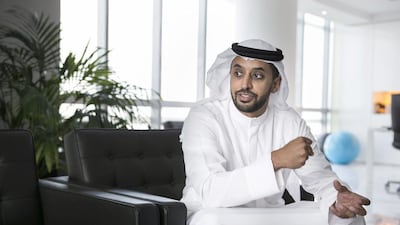Ahmed bin Sulayem, the chairman of the Dubai Multi Commodities Centre free zone, has been appointed as the chairman of the Kimberley Process organisation that works to halt the flow of “conflict diamonds” on to the world’s precious stones markets.
Mr bin Sulayem will take up the post at the start of next year with a pledge to build bridges between some members of the organisation that have been disenchanted with its work. “The UAE will use this opportunity to focus on areas that will have the greatest impact on growth and development, in addition to sustaining the core values of the organisation,” he said.
In particular, Mr bin Sulayem said he would have an “open door” for organisations that have threatened to boycott the KP proceedings in Dubai. “I would be happy to work with them and we would like to have a dialogue.”
Some members of the KP’s “civil society” arm – mainly non-governmental organisations – were opposed to the UAE’s chairmanship of the organisation.
A statement said Mr bin Sulayem would aim “to strengthen ties between government, industry decision makers and the KP’s civil society, which includes representatives from key NGOs”. Mr bin Sulayem also expressed his wish “to assist newly admitted countries, along with those that seek to join the KP, with technical assistance, training and consensus building through seminars and conferences”.
He said that he had pointed out to the NGOs the UAE’s contribution to various global humanitarian initiatives.
The KP was set up in 2003 and has 54 participants representing 81 countries.
Mr bin Sulayem said the “key issues” under his chairmanship would be getting certain member countries back into the organisation.
The Central African Republic was suspended in 2013 after allegations of smuggling diamonds used to finance warfare; Venezuela has been voluntarily absent from the KP for several years but is seeking to rejoin. “Venezuela has done the necessary review and is presenting its case for readmission,” Mr Bin Sulayem said.
He said that it took three years for Zimbabwe to be re-admitted to the KP despite the fact that diamond mines there were among the most advanced in Africa.
“The Dubai chairmanship will consider all that, but will also look at the new reality of the KP going forward. I feel we need to launch KP2.0, and the UAE, with its smart city policy, is the place to do that. The infrastructure is here to enable members to take advantage of the latest technology,” he added.
Abdullah Al Saleh, the undersecretary of the UAE Ministry of Economy, which formally made the appointment, said: “The UAE is honoured to have been elected KP chair by its fellow members. Mr Bin Sulayem has led Dubai’s drive to become a global commodities hub for over a decade and has a deep understanding of the diamond industry.
“2016 will be a unique opportunity for all KP participants to get first-hand experience of the UAE’s and Dubai’s infrastructure and trading community. We look forward to building upon the KP’s success to date as well as implementing new initiatives.”
Mr Bin Sulayem said he was “surprised” at the opposition to the UAE’s chairmanship. “The majority of member countries were for the UAE. Australian withdrew their candidacy and have been appointed vice-chairman with a view to becoming chairman in 2017,” he added.
The chairmanship was officially handed over to the UAE at a ceremony in Dubai last week, at which the outgoing chairman, Angola’s Bernardo Campos, welcomed Mr Bin Sulayem.
The DMCC has become one of the great diamond trading places in the world. Launched in 2003, diamond treading was worth $5m in its first year. Last year, it was valued at $35bn.
Mr Bin Sulayem said: “The UAE has supported the growth of the industry since 2003. It serves the needs of producing countries and producers while strongly supporting the transformation of the industry from a fragmented sector to a global industry, underpinned by a significant uptick in the transparent and refuted nature if the diamond trade.”
The UAE was the first Arab member of the KP on its launch in 2003 and is also the first to assume the chair.
The KP is the only tripartite representative group in the world, featuring government, industry and civil society. It has introduced and implemented a global certification scheme, increased compliance and transparency in the diamond market, and established a system of internal controls to determine the origins of diamonds.
“KP has recognised the issues and raised the working practices of artisanal miners, and has more or less eliminated the trade of conflict diamonds from the market place,” a statement said.
fkane@tnenational.ae
Follow The National's Business section on Twitter

